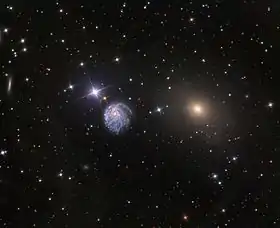NGC 2276
NGC 2276 is an intermediate spiral galaxy in the constellation Cepheus. The galaxy lies 105 million light-years away from Earth. NGC 2276 has an asymmetrical appearance, most likely caused by gravitational interactions with its neighbor, elliptical galaxy NGC 2300. One of the many starburst spiral arms contains an intermediate mass black hole with 50,000 times the mass of the Sun, named NGC 2276-3c. NGC 2276-3c has produced two jets: a large-scale radio jet, approximately 2,000 light years long, and an "inner jet" about 6 light years long. The galaxy shows an enhanced rate of star formation that may have been triggered by a collision with a dwarf galaxy,[2][3] or by the gravitational interaction with its neighbor compressing gas and dust.
| NGC 2276 | |
|---|---|
 | |
| Observation data (J2000 epoch) | |
| Constellation | Cepheus |
| Right ascension | 07h 27m 14.3s[1] |
| Declination | +85° 45′ 15″[1] |
| Redshift | 2416 ± 2 km/s[1] |
| Distance | 120 Mly (36.8 Mpc)[1] |
| Apparent magnitude (V) | 11.8 |
| Characteristics | |
| Type | SAB(rs)c [1] |
| Apparent size (V) | 2′.8 × 2′.7[1] |
| Other designations | |
| UGC 3740, Arp 25, Arp 114, PGC 21039[1] | |
It was discovered by Friedrich August Theodor Winnecke in 1876. In the Atlas of Peculiar Galaxies, the galaxy is mentioned twice, once as Arp 25, in the category spiral galaxies with one heavy arm, and one more time as Arp 114, in the category elliptical galaxies close to and perturbing spiral galaxies, in pair with NGC 2300.
NGC 2276 has been home to six supernovae in the last 60 years; SN 1962Q (mag 16.9), SN 1968V (mag 15.7), SN 1968W (mag 16.6), SN 1993X (type II, mag. 16.3), SN 2005dl (type II, mag. 17.1)[4] and SN 2016gfy (type II, mag 16.3).[5]
.jpg.webp)
References
- "NASA/IPAC Extragalactic Database". Results for NGC 2276. Retrieved 2006-11-18.
- "NGC 2276: NASA's Chandra Finds Intriguing Member of Black Hole Family Tree". Chandra X-ray Center. Retrieved 2 January 2016.
- Harbaugh, Jennifer (2015-02-26). "NASA's Chandra Finds Intriguing Member of Black Hole Family Tree". NASA. Retrieved 2 January 2016.
- List of Supernovae IAU Central Bureau for Astronomical Telegrams. Retrieved 29 December 2015.
- Spectroscopic classification of SN 2016gfy with the Nordic Optical Telescope The Astronomer's Telegram. Retrieved 17 October 2016.
External links
| Wikimedia Commons has media related to NGC 2276. |
- Supernova SN 2016gfy in NGC 2276 from The Virtual Telescope Project
- NGC 2276 on WikiSky: DSS2, SDSS, GALEX, IRAS, Hydrogen α, X-Ray, Astrophoto, Sky Map, Articles and images